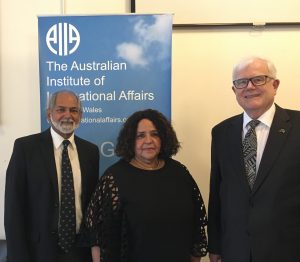South Africa and the prospects for the 2019 elections
On October 17 at Glover Cottages, Her Excellency Beryl Rose Sisulu, South Africa’s High Commissioner to Australia, gave a detailed overview into the prospects and current issues of the country, as well as what we might expect from domestic politics in the next two years.
High Commissioner Sisulu said that “South Africa is on the map”. A GDP growth from US$150 billion in 1994 to US$350 billion in 2017 highlights that the country is well positioned for investments to lead to further economic growth. Democracy in South Africa is still young, dating from the removal of the apartheid government and the rise of the African National Congress (ANC) in 1994. Allegations of corruption, and of government failure to respond effectively, have damaged the country’s reputation. In response, the government is aiming for greater transparency and inclusion. 42% of parliamentary positions are held by women and an ever-growing civil society is keeping the government in check. There is much more work to be done, but South Africa is proud of its progress in such a short time.

Photo shows Josh Abdurahman (AABC Secretary-General), HE Beryl Sisulu (South African High Commissioner) and Ian Lincoln (NSW Vice-President, AIIA)
The High Commissioner also addressed some of the larger economic issues the country faces, including unemployment and a slowdown in growth. Mines have closed, and many who live in the surrounding towns are moving towards cities. The government has embarked on a number of strategies in response. One strategy is to promote and encourage foreign investment as this will stimulate job growth. As an example, the High Commissioner pointed to South African tourism; 74,000 Australians visited in 2016.
The political climate is also facing new challenges. The ANC will hold elections in December 2017. The current ANC president and President of South Africa, Jacob Zuma, will reach the end of his second term and have to step down. However, this time the deputy president will not automatically assume the office; instead there are multiple candidates. There are many possibilities after December. The ANC presidential candidates are divided between supporters of Zuma and those who advocate for him to step down as state president. Despite the uncertainties in the period leading to the 2019 election, the High Commissioner was confident in claiming that this is not a crisis, but rather a manifestation of a democracy in the making.
The High Commissioner closed with a statement of gratitude to Australians who stood with South Africans against apartheid.
This event was jointly hosted by the Australia-Africa Business Council (AABC) and AIIA NSW.
Report by Damian Meduri,
AIIA NSW Intern